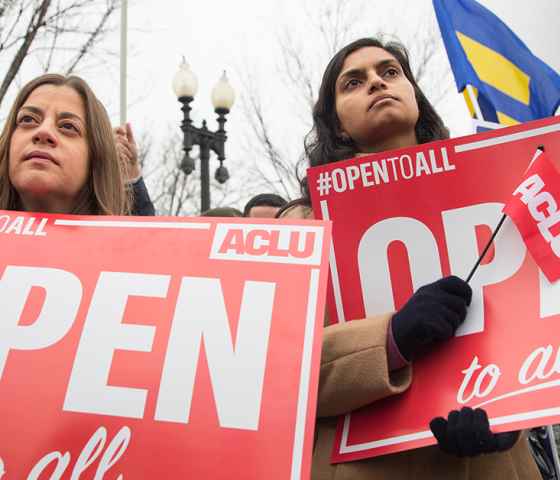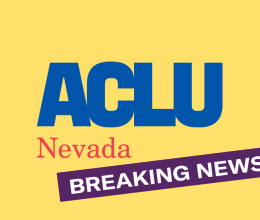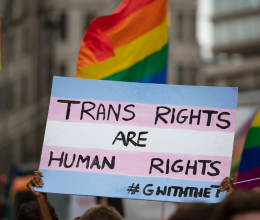On the issue of LGBT rights, Justice Kennedy played a critically important role in transforming the lives of lesbian, gay, and bisexual people in America. The landmark rulings he authored in this area transported us, as LGBT people, from being criminals in the eyes of the law to having the freedom to marry the people we love most in the world. With Justice Kennedy’s spot now open on the court, Congress must ensure that his replacement demonstrates that same dedication to upholding the basic American values of nondiscrimination and equality, which are essential to allowing LGBT people to live our lives freely and openly.
But while the U.S. Senate braces for what is certain to be an all-consuming, months-long confirmation battle over a new justice, we must not lose sight of the fact that there are things Congress can and must do now to safeguard the rights and dignity of the most vulnerable, regardless of who sits on the highest court in the country. One major thing that Congress could do is pass the Do No Harm Act, which would prevent religion from being used as a license to discriminate.
When it was signed into law 25 years ago, the Religious Freedom Restoration Act (RFRA) was intended to protect religious freedom, especially for religious minorities. In recent years, however, individuals and businesses have worked to distort RFRA into a blank check to license discrimination or to impose their religious beliefs on others.
The Supreme Court’s 2014 Hobby Lobby ruling marked the first time that the court said that business owners could use RFRA to deny their employees a benefit that they are guaranteed by law: insurance coverage for contraception. In her dissenting opinion, Justice Ruth Bader Ginsburg expressed concern that the decision could open the door for RFRA to be used to engage in a wide range of discrimination.
Justice Ginsburg’s concerns have proven to be well-founded in the four years since Hobby Lobby. Now, multiple cases currently under consideration could expand religious exemptions to anti-discrimination law even further.
The Supreme Court, for example, may hear a case in its upcoming term that involves yet another dangerous claim that RFRA permits discrimination. Aimee Stephens had worked for nearly six years as a funeral home director in Michigan when she took the difficult step of coming out to her employer as a woman. Rather than supporting Aimee during such a significant period of change in her life, the owner fired her, explaining that it would be “unacceptable” for Aimee to come to work as the woman she is.
In 2016, a federal judge ruled that even if what happened to Aimee was discrimination in violation of federal civil rights law, RFRA authorized that discrimination because of the funeral home’s religious objections to transgender people. Fortunately, this decision was reversed by a three-judge panel of the U.S. Court of Appeals for the Sixth Circuit earlier this year. The decision from the Sixth Circuit affirmed that transgender people are protected by federal laws that prohibit sex discrimination, like Title VII, and that RFRA cannot be used to trump those protections.
In the coming weeks, the funeral home is expected to ask the Supreme Court to take up the case. If the court does so, the stakes for LGBT people will be incredibly high.
In addition, the Trump administration is currently weighing a request from South Carolina to grant a waiver from federal nondiscrimination requirements to allow one of the largest providers of child welfare services in the state — and a recipient of large amounts of taxpayer dollars — to discriminate against prospective families who are not Protestant Christians. If granted, this “RFRA waiver” would cause children to be denied access to countless qualified families they desperately need, reducing their chances of finding loving, stable families simply because those families are LGBT or don’t adhere to particular Christian beliefs.
RFRA is being invoked in ever more brazen schemes to open the floodgates to all manner of discriminatory religious refusals. But it doesn’t have to be this way.
The Do No Harm Act, which is currently pending in both chambers of Congress, is designed to restore RFRA to its original intent. While maintaining the law’s use as a shield for religious minorities — for example, cases involving the right to wear religious garb and observe religious holidays — the Do No Harm Act would ensure that RFRA could no longer be used as a sword to harm other people, particularly LGBT people, women, and religious minorities.
If the Do No Harm Act were the law of the land, even a Supreme Court that is significantly more hostile to civil rights and civil liberties would not be able to use RFRA for discriminatory purposes, such as overriding the protections of our nation’s civil rights laws. Those who are very rightly concerned about the direction of the Supreme Court must do everything in their power to make sure our laws protect all people’s rights, especially the rights of those who are most vulnerable to discrimination. Passing the Do No Harm Act is an essential step towards that end.








